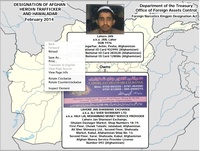The US Treasury Department added Lahore Jan, an Afghan national to its list of Foreign Narcotics Kingpins yesterday. His operations in transferring cash through his hawala help fund the Taliban.
Jan is “involved in moving money for the Taliban and other narcotics traffickers using his hawala [an informal money exchange],” Treasury noted in its designation. He plays a “significant role in international narcotics trafficking.”
Jan runs the Lahore Jan Shanwari Exchange, which is based in the city of Jalalabad in the eastern Afghan province of Nangarhar. Treasury provided specific information on the locations of Jan’s offices, including one in Kabul, as well as a photograph of Jan [click image, right]. The Lahore Jan Shanwari Exchange is described as the “the primary money exchanger for major narcotics traffickers.”
“He conducts hawala transactions between Afghanistan, Pakistan, the United States, the United Kingdom, China, and the United Arab Emirates and moves funds for various narcotics trafficking networks,” Treasury said.
In addition to serving as a conduit for untraceable cash for the Taliban and drug traffickers, Jan “and a close narcotics business partner control a heroin production operation in Nangarhar Province, Afghanistan.”
Jan moved money for Haji Bagcho, a major heroin trafficker who was sentenced to life in prison for “conspiring to distribute heroin to the United States and for using drug proceeds to fund, arm and supply the Taliban,” the Department of Justice announced in a press release after Bagcho’s conviction in June 2012.
“Bagcho used a portion of his drug proceeds to provide cash, weapons and other supplies to the former Taliban governor of Nangarhar Province and two Taliban commanders responsible for insurgent activity in eastern Afghanistan, so that they could continue their ‘jihad’ against western troops and the Afghan government,” Justice said. Bagcho was amassing enormous profits from the drug trade; it was determined that he made $250 million in 2006 alone.
Jan is the second Afghan to be added to the US’ list of Specially Designated Narcotics Traffickers in 16 months. In November 2012, the US added Mullah Naim Barich, the Taliban’s leader for the southern Afghan province of Helmand, to the list “for the significant role he plays in international narcotics trafficking, particularly in Helmand province, Afghanistan.” He moves heroin as well as produces it in both Iran and Pakistan. He then uses the proceeds to fund the Taliban’s insurgency.
Eight months prior to Barich’s designation, the US added General Gholamreza Baghbani, the head of Qods Force’s branch in the Iranian city of Zahedan, to the list of Specially Designated Narcotics Traffickers for supporting heroin and opium smuggling in Iran and Afghanistan “as part of a broader scheme to support terrorism.” The Iranian general supported the drug smugglers in order to arm the Taliban in Afghanistan. While Baghbani and Barich were not linked in the designations, it is likely they worked together.
Jan’s designation highlights a worrying trend in Afghanistan. As US and NATO forces begin to draw down, and possibly exit Afghanistan altogether at the end of this year, opium production continues to increase. According to a report from the UN Office for Drugs and Crime that was issued in November 2013, opium cultivation is up 36 percent from the 2012; in addition, cultivation is at a 20-year high. The Taliban, who generate a portion of their funding from opium harvesting and trafficking, will only benefit.









3 Comments
Perhaps this calls for special operations … without Karzai’s prior approval.
Various sources cite 83,000 opioid overdose deaths in the US between 1999 and 2005, 11,857 per year. This compares to 2,996 immediate deaths due to the terrorist attacks on US soil on 9/11. 80% of worldwide opium now comes out of Afghanistan. Does anyone in this administration consider this any kind of threat to US national security?
Grab Lahore Jan. Grab his “close narcotics business partner” in Nangarhar. Grab the office staff. Grab the money. But most of all, grab the records. And keep on going.
Granted, this would cause the complete collapse of the Afghan government … and the Taliban … but there could be undesirable results too.
I am in agreement with Dave.
That is the head of the snake you need to cut off.
it is estimated that less than 10% of the heroin in the US comes from afghanistan, most comes from columbia and mexico.
afghan heroin mostly goes to europe and russia.